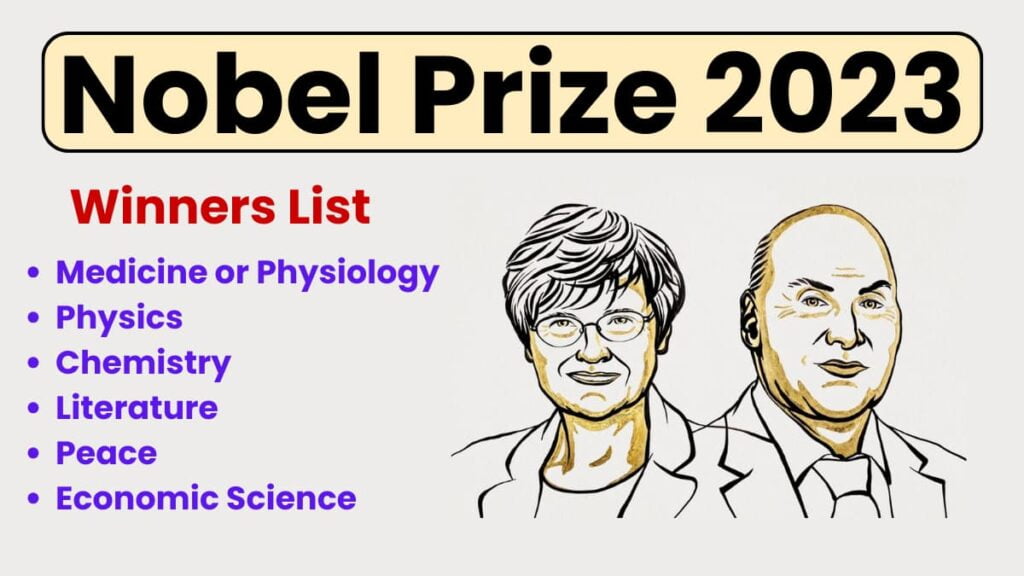Nobel Prize 2023: The Nobel Prize 2023 is being given from 2-9 October 2023. On 2 October 2023, the Nobel Prize in Physiology or Medicine 2023 was given jointly to Katalin Karikó and Drew Weissman “for their discoveries concerning nucleoside base modifications that enabled the development of effective mRNA vaccines against COVID-19” The Physics Nobel Prize 2023 was given on 3 October 2023. The Chemistry Nobel Prize 2023 was given on 4 October 2023. The Literature Nobel Prize was given on 5 October 2023. The Peace Nobel Prize was given on 6 October 2023. The Economic Science Nobel Prize was given on 9 October 2023.

Nobel Prize Winners List 2023
The List of all the Nobel Prize Winners of 2023 is given here. The Nobel Prize winners of 2023 in the field of Physics, Chemistry, Physiology or Medicine, Literature, Peace, and Economics is given below. The Nobel Prize Winners List 2023 will be updated immediately after the announcement of the Nobel Prize on that particular day.
| Field | Nobel Prize Winner 2023 | Cause |
|---|---|---|
| Medicine or Physiology | Katalin Karikó (Hungary) and Drew Weissman (USA) | For their discoveries concerning nucleoside base modifications that enabled the development of effective mRNA vaccines against COVID-19 |
| Physics | Pierre Agostini (USA), Ferenc Krausz (Germany), and Anne L’Huillier (Sweden) | For experimental methods that generate attosecond pulses of light for the study of electron dynamics in matter |
| Chemistry | Moungi G. Bawendi (USA), Louis E. Brus (USA), Alexei I. Ekimov (USA) | For the discovery and synthesis of quantum dots |
| Literature | Jon Fosse (Norway) | For his innovative plays and prose which give voice to the unsayable |
| Peace | Narges Mohammadi (Iran) | For her fight against the oppression of women in Iran and her fight to promote human rights and freedom for all |
| Economic Science | Claudia Goldin (USA) | For having advanced our understanding of women’s labour market outcomes |
Visit the Official Website of Nobel Prize 2023 for more information.
Introduction of Nobel Prizes
The Nobel Prizes stand as a testament to human achievement and innovation, honoring those who have made extraordinary contributions to humanity. Established in the will of Alfred Nobel, a Swedish inventor, engineer, and industrialist, these awards have become some of the most prestigious recognitions in the world. Since their inception in 1901, Nobel Prizes have celebrated the finest minds and the most impactful discoveries in a variety of fields.
History of Nobel Prizes
Alfred Nobel, born in 1833, was a polymath with over 350 patents to his name. He invented dynamite, which revolutionized the construction and mining industries. Nobel, during his lifetime, accumulated great wealth from his inventions. However, a premature obituary famously labeled him the “merchant of death” due to his inventions being used in warfare.
This incident led Nobel to reflect on his legacy. In his will, he left instructions for the establishment of the Nobel Prizes. He stated that his fortune should be used to create awards for those who had conferred the greatest benefit to mankind. Nobel passed away in 1896, and the prizes were first awarded in 1901.
Types of Nobel Prizes
The Nobel Prizes are awarded annually in the fields of Physics, Chemistry, Medicine or Physiology, Literature, Peace, and Economic Sciences. Here is a brief overview of each category:
1. Physics
The Nobel Prize in Physics recognizes outstanding contributions to the understanding of the natural world, particularly in the realm of physical sciences. Laureates in this category have often unraveled mysteries of the universe, from quantum mechanics to the theory of relativity.
2. Chemistry
The Nobel Prize in Chemistry honors significant advances in the field of chemical sciences. This award celebrates innovations that have enhanced our understanding of matter and the fundamental processes that govern it, leading to applications that benefit society.
3. Medicine or Physiology
This Nobel Prize acknowledges outstanding achievements in the field of medical science or physiology. It has recognized groundbreaking discoveries in areas such as genetics, immunology, and neurobiology, leading to profound advancements in healthcare and medicine.
4. Literature
The Nobel Prize in Literature is awarded for exceptional contributions to the world of literature. It acknowledges authors, poets, and playwrights who have enriched human culture and understanding through their literary works.
5. Peace
The Nobel Peace Prize is awarded to individuals, organizations, or movements that have made significant contributions to the promotion of peace and the resolution of conflicts. This category often highlights efforts in diplomacy, human rights advocacy, and disarmament.
6. Economic Sciences
While not originally included in Alfred Nobel’s will, the Sveriges Riksbank Prize in Economic Sciences in Memory of Alfred Nobel, commonly referred to as the Nobel Prize in Economic Sciences, was established in 1968. It recognizes exceptional contributions to the field of economics, emphasizing research that has practical implications for improving economic welfare.
Significance of Nobel Prizes
The Nobel Prizes have a profound impact on global culture and scientific progress:
1. Recognition of Excellence
The Nobel Prizes celebrate the best of human achievement, shining a light on exceptional individuals and their groundbreaking work. This recognition often leads to increased funding, collaboration opportunities, and further advancements in their respective fields.
2. Encouraging Future Generations
By highlighting the accomplishments of Nobel laureates, the prizes inspire new generations of scientists, writers, and peacemakers to strive for excellence and contribute meaningfully to society.
3. Promoting International Cooperation
The Nobel Prizes encourage international collaboration and the sharing of knowledge across borders. Many laureates have come from diverse cultural backgrounds, exemplifying the power of global cooperation in advancing humanity.
4. Addressing Global Issues
Nobel laureates have often tackled some of the most pressing challenges facing humanity, from climate change and healthcare to peace and human rights. Their work provides essential insights and solutions to these complex issues.

